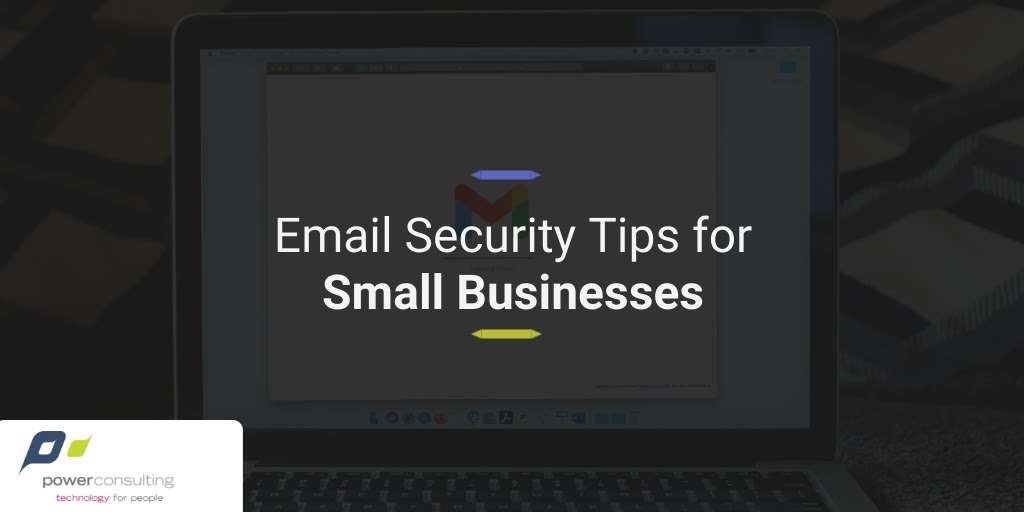
With over 96% of phishing email attacks delivered via email, the need for small businesses to have email security is more important than ever. x A successful phishing attack can result in very expensive losses for a small business. Worldwide, it’s estimated that businesses lose $17,700 every minute due to phishing attacks, and breaches caused by phishing can cost a business a staggering average of $4.6million! So how can you establish practices for secure emails for your small business? In this article, we will explore the top 5 best practices and tips that you can follow to minimize the risk of phishing scams or data breaches, resulting from an email-based cyber attack.
Small Business Email Security Tip #1: Set up Email Encryption
There are many services or even free apps that can provide encrypted emails for small businesses, although it is often best to rely on your managed service provider for that particular service. Email encryption essentially means you’re disguising the information in your emails so that anyone outside your organization (like hackers, for instance) can’t read the contents. Using email encryption also helps protect your organization from phishing emails and attacks because the hacker won’t be able to authenticate whatever phony email they send as an attack attempt. In other words, any phishing email that tries to dupe your employees will stand out like a sore thumb, ensuring even the most unaware person will notice that something is…well, phishy.
| Want to Protect Your Small Business from Dangerous Cyber Threats? Take a Look at these Short Articles! |
Small Business Email Security Tip #2: Create Strong Passwords
As with any of your private or business accounts, whatever passwords you have in place, you want them to perform as intended, i.e. acting as a legitimate barrier to anyone trying to break into your account. With any email service, you want to institute company-wide policies that insist on creating hard-to-guess, complex passwords. You can use a password manager to store all of these various passwords for your employees so that they can make them especially complex. But if you decide to use a password manager, be sure that the master password is extremely difficult to guess, and never leave hard copies of passwords lying around anywhere. Using strong passwords makes it that much harder for hackers to gain access to your business emails.
Small Business Email Security Tip #3: Backup Your Emails
Backing up your emails and email service in the cloud, especially via a managed service provider, offers great peace of mind knowing that, if a data breach should occur and certain data is wiped clean or held for ransom, you can simply perform a recovery operation. Many business owners and operators are unaware that Microsoft 365 and Google Workspace empty your account’s trash (deleted files) after 30 days, and are NOT recoverable. Power Consulting recommends that our clients have backups of all cloud-based data resources. It would be unwise to rely on Microsoft or Google to restore your files to you. Thus business email protection is highly recommended, as it can even protect against accidental deletions of email text bodies, email addresses, and attachments—all in a highly secure and safe way.
Interested in Implementing Emails Security Across Your Organization?
Get a free consultation and discover your specific needs for email backup today!
Small Business Email Security Tip #4: Use Multi-Factor Authentication
Even when strong passwords are bypassed, multi-factor authentication (MFA) will be your fool-proof backup defense. The way MFA works is that any time you or an employee try to log into an email account (or any account) using their legitimate username and password, you will get a secondary message sent (usually to your mobile device) with randomly-generated numerical code that is required to complete the login process. This ensures that even if a hacker were to gain an employee’s credentials, they still wouldn’t be able to hack the account and steal precious business information or sensitive data. 
Small Business Email Security Tip #5: Teach Your Employees How to Spot Phishing Emails
Since phishing emails are the most common form of email security breaches, it’s a best practice to educate both yourself and your employees on how to spot, avoid, and report suspected phishing attacks. Common signs of a phishing email to watch out for are:
- Strange or slightly odd sender email addresses
- Suspicious links asking you to provide personal information
- Obvious spelling errors in the message
Getting the Best Help for Developing Strong Email Security for Your Small Business
If you’re still worried about failing to spot attacks in the emails your business sends and receives, Power Consulting is here to help. Our end-user security support is an especially effective tool in your belt in the fight against hackers and phishing attacks. So contact us today to get a free quote and see how easy it is to get reliable email security protection.

